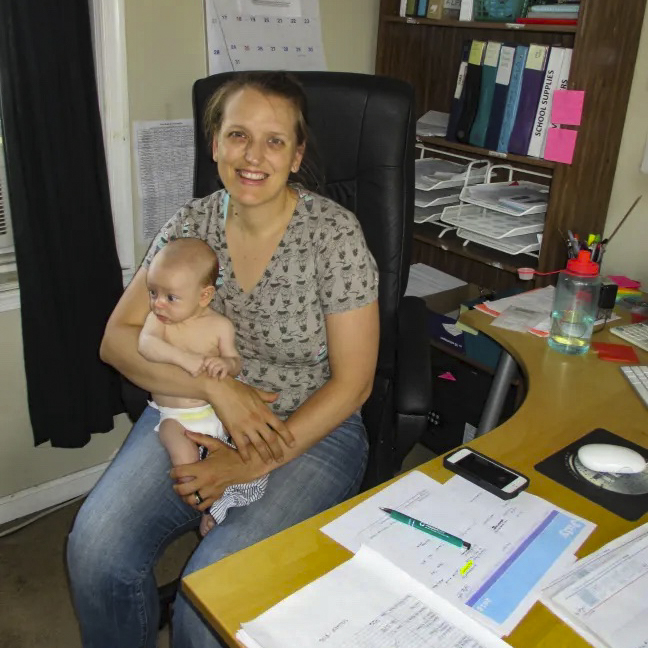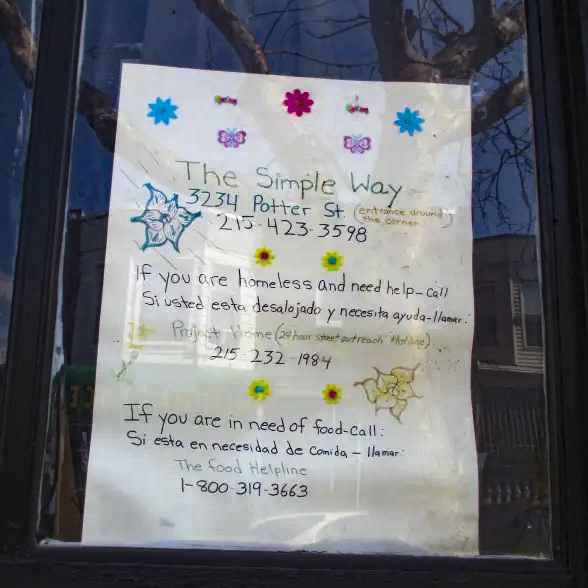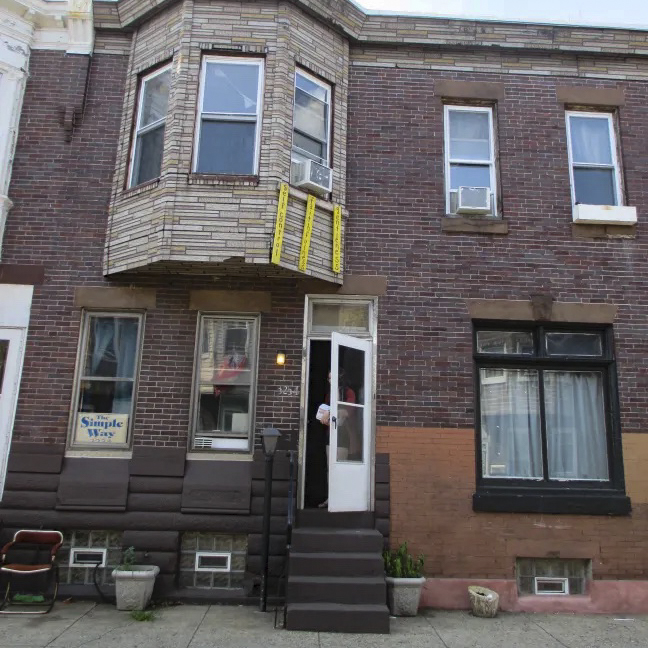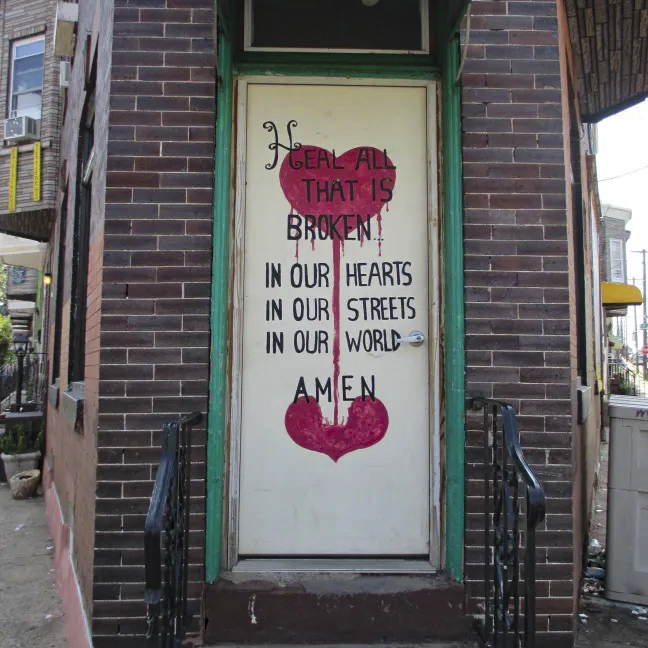Founded in 1998 by Shane Claiborne and five other Eastern College graduates in one of the poorest areas of Philadelphia, The Simple Way is a shining beacon of hope, hospitality and neighborly love. Indeed, their motto says it all: “Loving God, Loving People, and Following Jesus in our neighborhood and in our world.” Because The Simple Way believes that collaboration and interdependence allow for true flourishing, they have undertaken a number of initiatives: from food distribution (over 3000lb given away per week), to emergency services, neighborhood celebrations (not just Christmas, Easter, and Thanksgiving, but events in which the entire community can take part nearly every month), and what is called The Simple Store (profits of which go towards food distribution which benefits 600 neighbors a month).
In this interview, Caz Tod-Pearson, the director of The Simple Way, shares with us some of the reasons she believes in the work and why it sustains her. If you are interested in hearing about the value of just showing up, the beauty that can be found in mutual reciprocity and what real success looks like, you might enjoy reading or listening to Caz in this Radix issue.
Radix: Caz, it’s great to meet you. Plus, we get the cool New Zealand accent! First, I want to honor you for what you are doing. You honor the images of God in your neighborhood, and you do it in a beautiful way. thank you for what you are doing. I was talking to Joy earlier, and we were discussing how at family get-togethers, the stories that really warm hearts and are remembered are from the people who actually do the kind of work that you do—the kind that makes lives better. People love those stories. In a way, it’s an indictment against our society that the people who make the most money deal with things, and the people who make the least deal with people. Can you tell us more about The Simple Way, which was started by Shane Claiborne and some of his friends?
Caz: Yeah, it was started by six friends who went to college together at Eastern University. While there, they heard about this large group of homeless women and children who had moved into an abandoned church here in Kensington but were being told to leave. So the group decided to join them in their predicament and, essentially, tell the authorities, “Hey, it’s not okay that there isn’t affordable housing in Philadelphia.” that was the spark that lit the fire of TSW. The friends said, “Let’s see what it really means to follow Jesus.” So they moved into a house here in Kensington that was in close proximity to some of the families they had built relationships with. They bought a house and committed to five years of living together in community and just loving their neighbors. They were followers of Jesus, activists and anarchists.
Radix: [Laughter]
Caz: A lot of the early days of TSW are documented in Shane Claiborne’s book The Irresistible Revolution. It was just a lot of small acts of love. Just meeting people where they are at, you know? Like, hanging out with folks on the Avenue, under the train that runs by The Simple Way property. Or serving people around their dinner table, or giving away hugs on Buy Nothing Day. After everyone’s initial commitment, the founders, except Shane, moved on. Pursuing the same things they cared about in different ways. Through the story of TSW being told by Shane and in other ways, TSW continued to grow and gain more traction. The message was, follow the words of Jesus. And we are doing that. Of course, young people are really motivated by radical things, so they get a lot of people coming by. They even had someone walk all the way from Indiana to join them.

Since its beginning, The Simple Way has grown and changed. We have a number of different iterations of community. Then, in 2007, a big fire took out one of our buildings. At the time we had two buildings. One of them was a community center type space with an open space on the first floor for the afterschool programs and a commercial kitchen. The plan was to do large community meals. But then when the fire broke out in one of the city’s abandoned buildings across the street from us, it took out a whole city block and seven houses on the other side of the street. One of the houses was ours. So that really changed everything because of the attention we got. That attention afforded us a lot of financial support, which pushed us to organize a little more and to ask ourselves anew, what are we to do here?
We had a group of folks living intentionally together, and Shane’s platform continued to grow; we had lots of programs that were happening on the ground, both for the neighbors and neighborhood, but a lot of activities and programs outside of the neighborhood too. In general, we were in a kind of childlike state and had our hands in everything. I was on the board of directors at the time, though not living in the intentional community house. I was living in a different house on the block with my friend. The questions the board and community were wrestling with were, ‘Who are we, who should we be, and what is ours to do?’ Are we a large organization focused on supporting many efforts outside of Kensington, or are we a group of people living in proximity with folks we’re trying to love and support? So we started shaping or reshaping our mission once again.. Shane moved his public ministry to Red Letter Christians, and he’s been doing a lot of public work, writing, speaking, and activism work from there. We took some logs off our fire to make room for some air again, limited what we were doing and tried to be sure we were doing what we were originally founded to do: love God, love our neighbors, and follow Jesus. So that’s what we do on a daily basis—we just try to be really good neighbors.
We have a large food choice pantry that feeds about 150 people on average per week, which works out to around 3,000 pounds of food. We do regular rhythms of celebration, such as block parties and back-to-school parties, a big Christmas toy store, and we hand out Thanksgiving baskets. And then we have two garden plots where we grow vegetables for the food pantry and make garden space available for community use. We are just trying to show up and, alongside our neighbors, build a neighborhood in which we can all be proud and thrive.
Radix: That is so cool. It sounds like you folks do such great work. And it’s inspiring to hear that normal people can do it. Can you speak a bit about why people in your neighborhood find themselves in the difficult situation they are in? Because there are, no doubt, reasons for such disadvantaged living.
Caz: I live alongside folks and hear their stories and how they experience the world. I can try to share, but I will be making generalizations. There are really multiple overlapping issues that are the cause. One is a lack of consistent access to enough food for a healthy life. There is also a lack of affordable housing in the area, social isolation, and a basic lack of employment that offers a living wage. There’s social isolation due to racial and social inequalities. That feeds into chronic health problems and high medical costs. People just can’t afford to deal with acute health problems to the extent they might need to. Many people in this neighborhood—and others like it—have to deal with these issues, and it makes it difficult to participate in, what to many of us, is normal life. People’s quality of life is greatly affected.


And it’s so easy for us to think, well, if they just managed their money better, or if they would have gone to school and furthered their education, they would have everything they need. But that just isn’t the case. There are a bunch of overlapping issues, and those all lead to cycles of poverty.
Radix: In one of the videos I watched about The Simple Way, I was moved by one man saying, “Don’t look at my neighborhood as this impoverished, bad thing; look at the kids playing on the streets and see us as individuals.” And I am betting, because of how you invest your life, that you have cultivated a holy way of relating with and seeing individuals within a broader context; that you see the face of Jesus in each face that you meet. I guess I want to hear more about how you cultivate that. What nourishes that? Because I can really hear your compassion, hope and love as you speak.
Caz: It was very generous of you to say that I have a holy way of seeing people because I certainly am not gracious and kind to everyone I meet all the time, especially when someone’s car is blocking my way and I’m late to get my kid to school.
Radix: [Laughter]
Caz: But we are all caught in these systems, right? We are all caught in these societal norms and silos where we are trying to determine what is right and or wrong, who is in our group and who isn’t. And I think on some level that we need those structures or containers to understand ourselves and each other and how we are to operate in the world. We have to learn to do the work of understanding that our containers, structures and barriers affect how we see others, or even ourselves. We really need to be honest about our judgments and prejudices.
It’s an ongoing, difficult work to continue to show up, and to be willing to see each other’s humanity—to look past the filters and barriers and see every person as who they are: an image of God. I don’t always do that. When I see a drug dealer on the corner, I don’t say, “Oh, you’re a wonderful person created in the image of God.” I often get mad. But sometimes I am able to slow down enough to be curious and say, “I wonder why this is where they’re at.” Part of the reason for the struggle is fear. I fear what is outside my norm. Also, some fears are created by my experience. But these are the silos and barriers that I was speaking about. I think the way out of this is to have soft eyes; to be curious and open and gentle in my looking.
I call myself a contemplative and I would say that my spirituality is that, too. For me, contemplation is taking a long, loving look at what’s real. So often, what we think is “real” is not. Instead of being vulnerable and open, we live in illusion.
Radix: That is really beautiful. I especially like the part about soft eyes. And what you are saying takes honesty. Learning to see rightly takes work and intention.
Caz: And I would also say that this work of truly seeing never ends. We live in a world where we are constantly being told to be afraid of someone who’s different. I mean, there is a tension, right? I am not sure I can live in a world where we are constantly and serenely accepting everyone. We live in a world of crisis. But for me, it’s a spiritual practice to continue to see people and look for their humanity.
Radix: What I am hearing in this is that when we are living in relationship—in intentional, genuine relationship with others—and participating in their stories, we can’t help but be changed.
Caz: Yes.
Radix: This brings me to the rather false idea that there is a service recipient and a service provider. And it’s true that sometimes there is a one-directional flow of material goods. But there is more to it, right? There is a mutual reciprocation and both sides get blessed. Can you speak to that?
Caz: Our lives are so modeled on transactional living: you scratch my back and I’ll scratch yours. We don’t really think that we need each other. Which is really a power dynamic, right? Mutuality is the idea that we can move together into wholeness, knowing that we are not whole without each other. This also means we think of each as having equal value.
I have experienced mutual reciprocity when I have been able to feel empathy given to me from another person who is different from me; when they see me and hear my story. I have experienced that in this community.
I have been living here for thirteen years, and I have experience and a certain skill set that I came with. And yet it’s really important to me to be able to receive help from the people around me. So when I had my first child about seven years ago, I was so grateful to be able to receive help from one of the older women in the community. She is a Puerto Rican and has raised five kids, and what was so meaningful to me was how she noticed when I needed something, and she’d take my baby and cuddle him and tell me everything was going to be okay. Here we were, so different in age and nationality, and our experiences were so different. But there was this place where she could just see me, hear me and care for me in those moments that I needed it. It changed our relationship, because I felt that she really saw me. She offered me a place to just talk and share and know that everything was going to be okay. That kind of thing is so meaningful, and people want to give you that. They want to give you what they can. They want to love you.
Radix: That is so meaningful. Everything you just said.
Caz: Belonging to each other is a human need. I think we are always looking for who we belong with and where we belong. Often, we can find that in our families, but I don’t live near my nuclear family. I have to accept that this is who I can belong to. It’s too easy for many of us in our position of dominance to not allow ourselves to be vulnerable, and that creates barriers. So I always try to live in such a way that I am not measuring need or suffering, but just living and working alongside others. I have found that even when I am working alongside someone who has greater need than me, I can always receive help. In my case, I just needed to hear her say “everything is going to be okay.” It seems small, but it was immensely meaningful.
Radix: When we talked on the phone, you brought up the importance of community and community building. Can you tell us more about that, and why it’s important? Especially in light of what you just mentioned about vulnerability.
Caz: Community can have a loaded connotation. People often think of community in terms of who they live with, or share money with, or their church community all put together. We have to consider the individualistic society that we live in that values independence so highly. We really need to see that we are not whole without each other. I was reading Ken Wilber’s book recently, A Brief History of Everything. He talks about how small parts equal larger wholes, but that the small part is a whole in and of itself. What I am trying to say is that I see the importance of community in how it helps me become a whole person. When I help other people be whole, that makes us complete together.
We are created to live in community. I have a group of people that know I will sacrifice for them so that they can live well, and I know they will do the same for me. Then the question is, are we willing to do that on a larger scale? That’s what I want.
Radix: I’ve heard you talking about community and wholeness and interdependence, and of the path to wholeness, and how we heal together in the context of community. I’m also thinking about what, oftentimes, funders or well-intentioned stakeholders assume success looks like. The expectation can be that the person being helped has become fully independent and able to take care of themselves. For many, that is the “success” that is looked for. But I am hearing you talk about thriving through a mutual wholeness – through interdependence, really. Can you talk a bit about how to engage heart change and maintain joy and courage in the midst of suffering when things get challenging?
Caz: Often, in life, we are asking, am I good enough, am I doing enough, am I really making a difference? Can I prove that I am making a difference? I don’t think there is an answer. Measuring change in the work I do is incredibly hard, and it’s really subjective.
I have felt at times, do I still want to continue what I am doing? Is it worth the fear and the stress? But then I realize that this line of thinking is futile. I might feel that way if I was doing anything else. So I think we need to learn to reflect carefully on ourselves, our work, and our relationships through the values we hold. These are the things that motivate me: to show up and be helpful. We need to be living life in a way that is congruent with our values. We have to ask ourselves, are we living out the values that we want? That’s the measure for me, not whether seventeen people are changed or not. Because I can’t change people. And someone I helped might not even remember me in five years. I don’t know if my helping provide food for a family for the next five years will help them put a deposit on a home. I might not see them after four years. So I don’t know whether what I am doing today will impact someone, but I am trusting that it does. If I am showing up in this community, believing that my whole self being here makes everyone more whole, then I am making an impact. I do believe that I’m showing up in every way that I can; that means that I’m showing up as Christ in the world.
Radix: What you are saying goes along with being willing to obey a call. You aren’t looking at the results, you are being obedient to a call. You are kind of like a seed planter: you plant the seeds, but you know that you might not see the flowers. Still, you keep planting.
Caz: Exactly. Every seed needs to be planted and watered, and we hope for the seed to grow. But we are not God and we can’t take on God’s responsibility. Our prayer often is, God help me do this. Our prayer should be, God let me join your prayer for this person, this situation, or this neighborhood.
Going back to what success is, I think we need to see our value not as based on our actions or what we do but just by the fact that we exist. We are beloved of God. We often esteem value based on productivity or whatever, and we don’t even know how to tell stories about ourselves that aren’t related to our work. And often we don’t even count our hobbies as part of our identity, because they aren’t “productive.” I wonder to myself, what if we in the western world began to understand ourselves not by what we have? And like you said earlier about people getting more money for certain jobs, my question is: what would happen if we all just got paid the same? What would that look like? What are we afraid of here? I think we have gotten our values all wrong. We need to have a better way to define what success is.
Radix: Do you have a particular way of engaging would-be volunteers in ways that inspire their imaginations about how they can actually do something, or see others better, in ways they might not necessarily think of?
Caz: One thing we have done over the years is turn volunteers away. We used to tell people to come here because they were needed, and that’s true. But what I don’t want to happen is for the potential volunteers to be doing something that someone in this community could be doing. Also, I don’t know that volunteering is always the best way to demonstrate sacrifice. Real sacrifice involves knowing our true selves, and knowing what we have to offer and what our gifts are. I think we all have to ask ourselves that question when we are wanting to volunteer, for anything. All this doesn’t mean that we don’t have volunteers who we are happy to have. And part of this goes back to our wanting to have as much dignity shown to people in our neighborhood as possible. Some of that looks like hiring people from within our neighborhood, right? Like, instead of having outside volunteers work in the food pantry handing out food, we hire someone in our neighborhood—with a living wage—to do it. When we can do that, the whole dynamic between people is different. We have to consider and reframe motivations for volunteering in the light of privilege, dominant culture, and upper-middle-class socioeconomics.
Radix: Now for the last question, one of our favorites: if you were able to have all the pastors in North America in a room, and they had to listen to you with a smile—because when people smile they are more likely to be in an agreeable mood—what would you ask them to think about or do?
Caz: I would remind them that they have been given a platform, and that with that platform comes responsibility. So I would ask them to be really thoughtful, and to look at what they say carefully. But along with that I would ask them to please teach people to know who they are. And I would ask them to encourage people to know their own story and identity, including where they came from and how they got there. Encourage people to value differences. Give people confidence so that they don’t have to be afraid when they come up against something different than themselves, whether that is race, identity, or faith tradition. And teach people the value of learning to be curious and the value of wonder.
But most importantly, don’t just tell. Show and give actual practices that people can use in their lives. People need to be given ways to practice life together, as communities.

